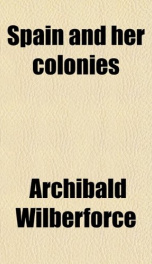spain and her colonies

Purchase of this book includes free trial access to www.million-books.com where you can read more than a million books for free. This is an OCR edition with typos. Excerpt from book: CHAPTER III MEDIEVAL SPAIN THE FOUNDERS OF MODERN SPAIN THE KINGDOMS OF THE ASTURIAS AND OF LEON THE DEFEAT AT RONCESVALLES THE CID CAMPEADOR The Crescent had conquered, but the Cross endured. The refuge of the latter was in the Asturias. There eight or ten years after the death of the last of the Gothic kingsPelayo, one of the early heroes of Spanish history, was reigning over refugees from Moslem rule. It was these refugees who laid the foundation of modern Spain, and it is related that in their fastness at Cova- dongo, thirty of them, with Pelayo at their head, actually routed, if they did not destroy, an entire army of four hundred thousand Moslem besiegers. The story is of course mythological, but the good fortune of Pelayo did much to kindle the national spirit by which ultimately Spain was conquered for the Spaniards, and thus the story, if critically false, becomes metaphorically true. Nor [says Burke] do the Arabs seem to have made any attempt to retrieve or avenge the fortunes of the day. Well satisfied, no doubt, with their unopposed dominion over the rich plains of the genial south country, they were willing to abandon the bleak and inhospitable mountains to their wild inhabitants and the emboldened refugees whom they sheltered. Be the reason what it may, Pelayo seems to have had peace all the days of his life after his victory at Covadonga in 718. Prudently confining his attention to the development of his little kingdom, he reigned, it is said, for nineteen years at Cangas, and, dying in 737, he was peacefully succeeded by his son Favila. Pelayo, no doubt, was but a robber chieftain, a petty mountain prince, and the legends of his royal descent are of later date, and of obviously spurious manufacture; but Pelayo needs no tinsel to adorn his...
Info about the book
Author:
Series:
Unknown
ISBN:
1145643507
Rating:
3/5 (3)Your rating:
0/5
Languge:
English
Users who have this book
Users who want this book
What readers are saying
What do you think? Write your own comment on this book!
write a commentif you like spain and her colonies try:
Do you want to read a book that interests you? It’s EASY!
Create an account and send a request for reading to other users on the Webpage of the book!


